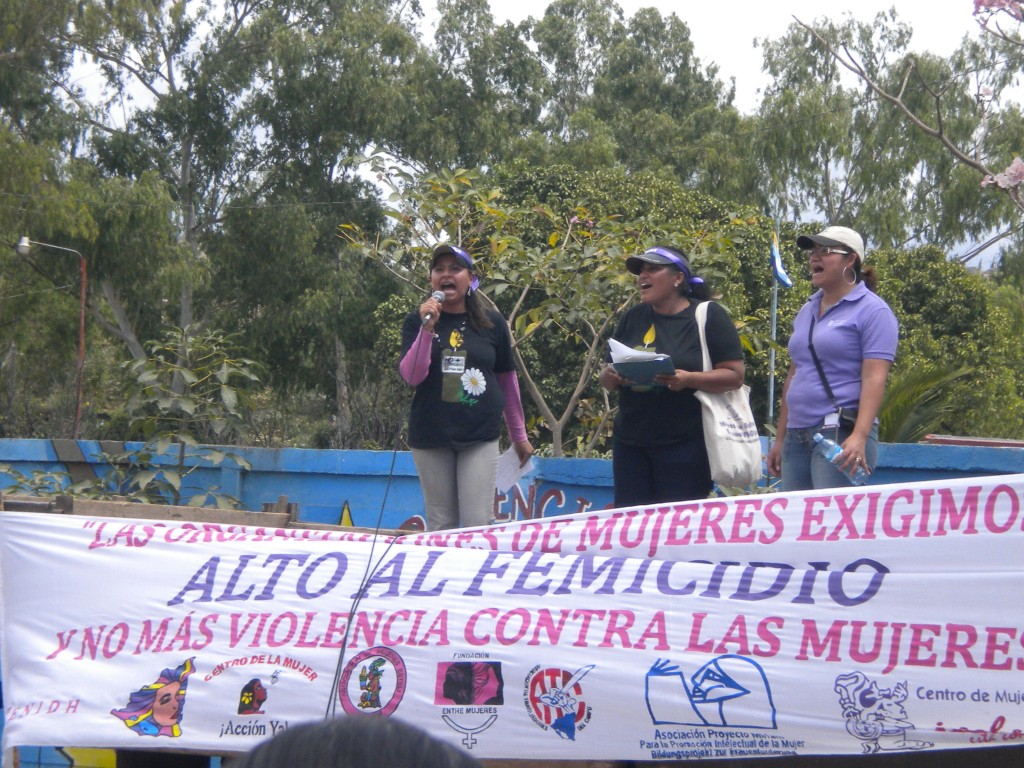Violence and Femicide in Nicaragua
Jan 21, 2015
First story

A Step Forward for Nicaragua's Women's Movement
Nicaragua’s Comprehensive Law against Violence against Women was passed in on January 26, 2012, in an attempt to recognize and address the inferior roles that women play in this machista society as a societal problem and even an issue of public health. The law tries to make real the equal rights granted to women in the Nicaragua Constitution so that they can live a life without discrimination, and includes 65 articles presenting new crimes in the areas of physical and psychological violence, hereditary violence, intimidation or threats against women, deduction of daughters and sons, femicide, workplace violence, violence against women within public institutions, the omission of accusation and the obligation of accusation of sexual harassment.
The law was considered a big step for the women’s movement in Nicaragua, a country with a patriarchal, Catholic-leaning state, where any form of abortion has been criminalized, even in cases of incest, rape and risk of death to the mother. In October, 2010, twenty-one organizations led by El Movimiento María Elena Cuadra presented to the National Assembly a proposal of the law backed by 30,000 signatures (for the Assembly to hear any proposal, it must be backed by more than 5,000 signatures). Four months later, the Supreme Court of Justice presented a similar proposal, and out of these two initiatives came the Comprehensive Law against Violence against Women, which was approved by the National Assembly in on January 26, 2012, with 84 of 91 assembly members voting in favor.
The term femicide became widely used in raising awareness to the extreme occurences of violence against women in Ciudad Juárez, Mexico. In this new law, femicide (femicidio) is defined as “the most extreme form of gender violence, understood as violence exercised by men against women, in their desire to obtain power, domination or control. This includes murders resulting from domestic or inter-familiar violence. It is the deprivation of a women’s life because of reasons related to her gender.”
Beyond defining a femicide, the law imposes longer sentences to those convicted of a femicide versus the sentences appropriated for a crime of passion. This attempts to address a growing societal tendency towards femicides; in 2011, there were 76 accounts of femicides in Nicaragua, and some non-governmental sources report up to 78. This statistic has been on the rise in the past six years or so. But can a law encouraging harsher sentences against offenders stop a growing societal tendency? Can Nicaragua’s judicial system follow through to uphold the new law and give offenders the punishment they deserve?
Fear in Estelí
The law will see its first cases only days after its passage; in the Department of Estelí, two women were brutally killed within 72 hours of one another.
Rosa Graciela Ardón Baltodano, 23, was killed at the hands of her ex-partner of three years Juan Roberto López Gámez, 63, on February 13, 2012. He stabbed her fourteen times and she was found dead with her cell phone in hand, 23 incoming calls from Roberto in the last hours of her life. They had been separated four months, but Rosa was in Gámez’s hometown, Estelí, accompanying her mother to the hospital. Gámez fled the scene of the crime and has yet to be captured.
The following day, February 14, the “Day of Love and Friendship,” the body of another young girl was found mutilated and murdered in the community of Piedra Larga, close to Condega. A few days perished, her body was already in decomposition and disfigured by machete wounds. To this day, she tragically remains unidentified and her aggressors walk free.
Marching against Violence against Women
In response to these killings and the continued prevalence of violence against women, I joined the Network of Support for Women in a march against the violence against women on February 20, 2012. La Fundación Entre Mujeres is a leading member of the network, and other members include Ixchen Estelí, La Secretaría de la Mujer de la ATC, Proyecto Miriam, Asociación Estelí Xilonem, El Movimiento de Mujeres María Elenea Cuadra, Acción Ya Estelí y El Centro Nicaragüense para los Derechos Humanos. The 600 or so women and men that marched with us demonstrated a desire for justice, demanding that these women’s cases not linger in impunity as many have before. They also raised awareness to that these femicides are not isolated cases, but part of a greater inequality that exists between the sexes, and that it unnatural.
After blocking off the Panamerican Highway, we ended the march in front of the National Police Station in Estelí. An aunt of Rosa expressed the fear and grief they felt in the wake of Rosa’s murder. A stirring speech by the mother of Yerling López, a 22-year-old murdered in May of 2011, exhorted follow-through in the pursuit and capture of her daughter’s aggressor. The manager of a tobacco factory across the street from the police station explained why she deemed it important for her female workers to be able to join the march and why other businesses should do the same. A young man read a declaration of the Network of Men from Miraflor condemning the femicides. Representatives from most of the supporting organizations spoke to demand an update on the investigations of Rosa and the unidentified woman’s murders. The commander of the National Police came out of the station and addressed us. He reported that his forces are searching Rosa’s offender and the identity of the woman discovered in Piedra Larga. But his refrain compelling us to “have faith” in their investigation did not address the question of women’s rights at hand and if anything recalled the inappropriate connection that exists here between the church and the state. He gave no reason to believe there would be a change from the ordinary unsatisfactory police work. As I write more than two weeks later, Juan Roberto López Gámez has not been captured, and the woman discovered in Piedra Larga remains unidentified.
Is it enough?
Nicaraguan society needs to begin to grant its women the right to live a life free of violence, a human right. This law takes the first step in recognizing a deep societal issue, but its effectiveness depends on two main factors. First, the judicial system needs to increase its capacity in the investigation, capture, and persecution of offenders. And second, civil society must play its role by condemning machista attitudes and supporting the judiciaries in their efforts against femicides. Ending machismo may not be possible in one generation and maybe not even ten, but awareness is the first step and change will follow. Operating inside of a patriarchal system, the women’s movement must continue growing and fighting for their rights.
What will it take?
The weekend following the two murders in Estelí, headlines screamed “ENOUGH!” as they reported that two more women were murdered in Nicaragua. In a hotel in Managua, a woman was strangled by an ex-partner who was discovered sitting next to her cadaver the next day. In Jinotega, a woman was attacked by her ex-partner during a canoe ride to the point where she fell from the boat and drowned. Once drowned in the water, he shot her. This happened with her 7 year-old son looking on.
And thus the figures increase: at least eighteen femicides in Nicaragua so far this year. Meanwhile, women’s fears of violence keep them trapped living without their full rights as citizens.




